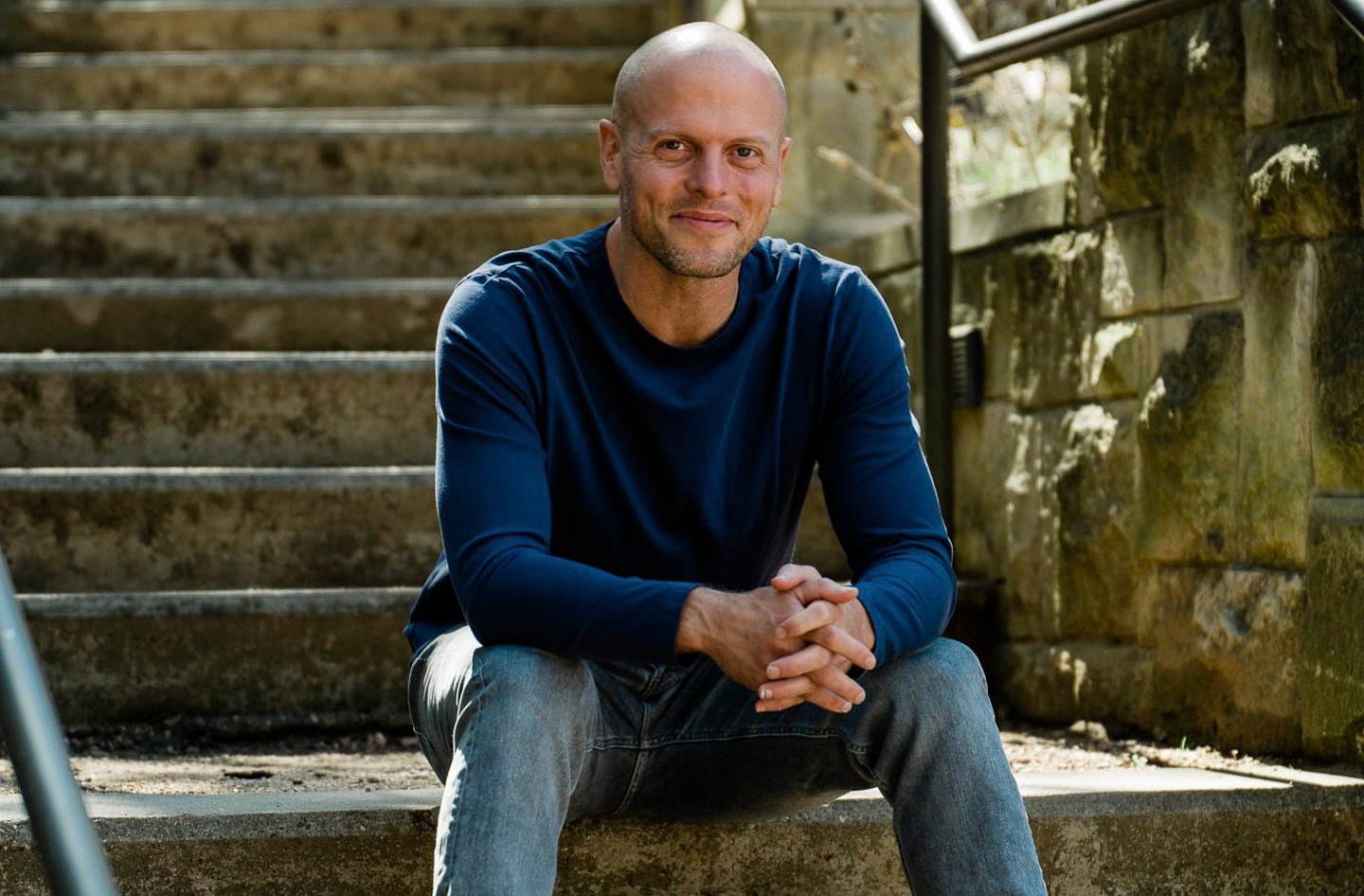
There’s no one quite like Tim Ferriss.
He’s not a tech founder, not a scientist, not a therapist — and yet he’s been all of those in some form. He writes, speaks, invests, interviews, experiments, and disappears for long stretches to figure things out on his own terms. Some know him as the “4-Hour Workweek guy,” others as the host of one of the most popular podcasts on the planet. But labels don’t stick easily to someone like Ferriss.
What he really does is explore: ideas, systems, fears, pain, growth. And he’s spent the last two decades pulling back the curtain on his own life to help others build better ones.
Growing Up in New York, and Feeling Out of Place
Tim Ferriss was born on July 20, 1977, in East Hampton, New York. He grew up in a modest household, and while there’s not much drama in his early story, there’s a lot of curiosity. He wasn’t the classic overachiever, but he was always intense — not about fitting in, but about figuring things out.
He’s talked before about being small and sickly as a kid, which led him to obsess over strength and control later in life. Books became an early escape, and by the time he went off to boarding school at St. Paul’s, he had already developed a taste for doing things his own way.
Ferriss ended up at Princeton, where he studied East Asian Studies and wrote a senior thesis on the political influence of Japanese media. Not the kind of thing you write just to get a degree — clearly, the guy had always been wired a little differently.
The Real World Hits — and the Pivot to Entrepreneurship
After graduating in 2000, Ferriss briefly took a job in sales. It didn’t last long. The structure bored him, and the pace wasn’t fast enough. So he did what a lot of restless 20-somethings do: he started his own thing.
He launched a sports nutrition company called BrainQUICKEN, selling a cognitive supplement online. What followed were years of grinding — 80-hour weeks, doing everything himself, and chasing an elusive idea of success. Eventually, it caught up with him. He burned out hard.
That crash led to what would become the biggest breakthrough of his life.
The 4-Hour Workweek: An Idea That Changed Everything
Tim left the country, took a sabbatical, and started writing down everything he had learned about time, work, and freedom. The result was The 4-Hour Workweek, published in 2007 — a book that challenged just about everything people were taught about success.
He wasn’t just saying “work less.” He was saying, live differently.
He introduced concepts like mini-retirements, outsourcing personal tasks, automating income, and rejecting the 9-to-5 altogether. It was radical for its time — especially in a world where remote work wasn’t normal and digital nomadism wasn’t a buzzword yet.
People either loved it or dismissed it as fantasy. But it worked. The book exploded, landed on the New York Times bestseller list, and eventually became a worldwide phenomenon.
Ferriss didn’t just find success — he became a movement.
Chasing Performance, Then Questioning It
Once The 4-Hour Workweek blew up, Ferriss leaned into the identity people gave him — the guy who figured out the hacks. In 2010, he released The 4-Hour Body, where he detailed experiments in fat loss, muscle gain, sleep improvement, and even sexual performance. Again, he used himself as the guinea pig, and again, the book sold millions.
Then came The 4-Hour Chef in 2012. It was about cooking on the surface, but really, it was about learning — how to master any skill fast. It was part cookbook, part field manual, part philosophy.
But underneath all the success, something was shifting.
Ferriss has said openly that he began to feel boxed in by the “4-Hour” brand. People expected shortcuts, but he was evolving. He cared more about depth, about wellness, about what was going on beneath the surface.
So, he pivoted again.
The Podcast Era: A Window into the Minds of the Greats
In 2014, Ferriss launched The Tim Ferriss Show, not expecting much. But it took off. People loved the long, honest, unscripted conversations. Unlike most interviewers, Ferriss wasn’t afraid to ask about failure, fear, or therapy. And his guests — from investors and athletes to artists and scientists — often opened up in unexpected ways.
Over the years, he’s interviewed guests like:
- Arnold Schwarzenegger
- Naval Ravikant
- Brene Brown
- Maria Popova
- LeBron James
- Malcolm Gladwell
- Tony Robbins
The show grew into one of the most downloaded podcasts of all time, crossing over 900 million downloads. But more than the numbers, it became something deeper — a kind of digital mentorship for millions of listeners.
Investing: Quiet Moves, Big Returns
Ferriss rarely brags, but he’s been an early investor in some huge names: Uber, Shopify, Facebook, Twitter, Duolingo, and others. He wasn’t throwing darts. He built real relationships in the startup world, and people respected his ability to see around corners.
He’s also invested in health and wellness companies and put a lot of energy into startups that align with his values — longevity, mental health, and unconventional education.
Between his books, podcast, investments, and business partnerships, his net worth is estimated between $100–120 million as of 2025. But if you follow his work, you know: money was never the end goal.
Relationships and Personal Life
This is the part most public figures love to show off — Ferriss doesn’t.
He’s always been extremely private about his dating life. While he’s mentioned past relationships here and there on the podcast, he’s never publicly named a girlfriend, and he isn’t married.
What he has talked about, though, is vulnerability. He’s been honest about how difficult it’s been for him to open up emotionally, to trust, to connect deeply in romantic relationships. That honesty is rare in the world he comes from, and it’s made his work even more relatable.
Mental Health, Psychedelics, and Going Inward
In recent years, Ferriss has taken a sharp turn inward. He’s opened up about his struggles with depression, suicidal thoughts, and the darker sides of high achievement.
This journey led him to therapy — and eventually, to psychedelics. Ferriss has become one of the biggest private funders of psychedelic research in the world. He’s donated millions to studies exploring how substances like psilocybin and MDMA can help treat trauma, addiction, and depression.
This isn’t a trendy phase for him. It’s personal, and deeply important. He’s said before that helping bring this research to the mainstream may be the most important work of his life.
Philosophy: What Drives Him Now
If you want to understand what makes Ferriss tick, it comes down to this: he’s always asking better questions.
He’s obsessed with systems — not to become perfect, but to free up time and energy for what matters most. He reads Stoic philosophy, experiments with extreme routines, meditates, journals, fasts, reflects. Then he shares the results so others don’t have to start from scratch.
He’s not trying to be a guru. He doesn’t pretend to have it all figured out. And that’s what makes him credible.
Ferriss once wrote that life is short, but it’s wide. And if you’ve followed his journey, that line feels more like a mission statement.
Final Thoughts
Tim Ferriss isn’t a motivational speaker. He’s not here to hype you up or sell a perfect morning routine. He’s a thoughtful, often intense, sometimes awkward guy who’s spent most of his adult life asking one big question: How can we live better lives?
And he’s turned that question into books, podcasts, essays, and conversations that have shaped the thinking of millions.
He’s far from done, but even now, Tim Ferriss has already made one thing clear — you don’t have to live by default. You can choose, question, design, and rebuild. And maybe, just maybe, the answers you’re looking for are the ones you’re willing to test on yourself.






